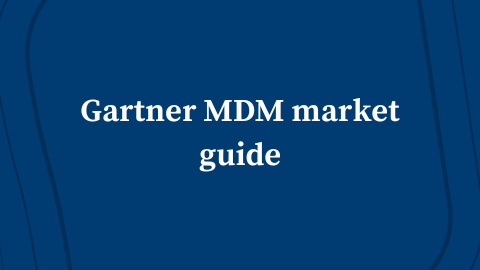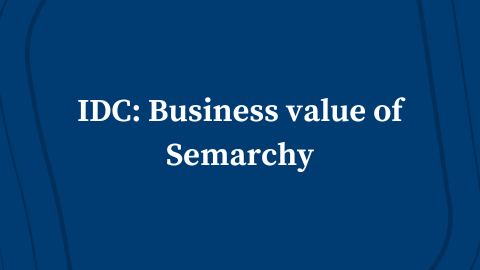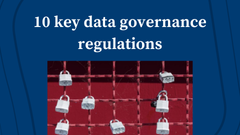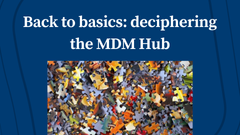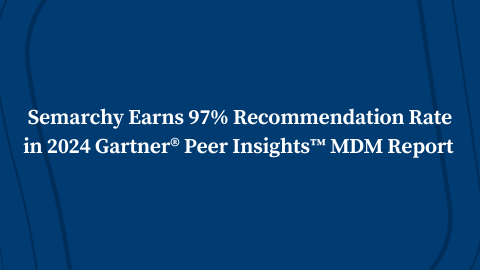By Scott Moore, Director of Presales, Semarchy
Why is data governance important to your business? This might seem like it would be a rhetorical question. The power of data in driving businesses today is well-recognized.
Data is power and your insights better be data-driven. So, it follows that data governance is important as well – right? But why is this exactly – what does data governance do for the bottom line? In this blog post, I will go over three reasons why data governance is important to your business, and why the importance of data governance will only increase.
For clarity’s sake, what is data governance?
It is easy to guess the meaning of data governance. Here’s what someone on the street might say:
A company has a lot of data coming in externally and more data being created or updated internally, so that data should probably be ‘governed’, so you have good data.
That’s a fair take, and it hits the near the heart of the definition – but it doesn’t go all the way.
Consider this definition:
Data governance is a set of processes that ensures that important data assets are formally managed throughout the enterprise. It ensures that trusted information is used for critical business processes, decision making, and accounting.
Read more about Semarchy’s Data Governance Practice here.
Now we’re getting there – let’s unpack this further. Within this definition, we have three main pieces of the overall data governance puzzle.
-
- Rules for inputting and maintaining data (accepted definitions, stylistic rules, etc.)
-
- Enforcement of those rules (what happens when someone inputs a State as MI instead of Michigan? Will the system correct this or nudge someone in the right direction? It should. Are people aware which form of “state” is correct? They should be.)
-
- Management of the data – data stewards and users within the company working on the data in accordance with those laws.
When those three factors are present and functioning together within a company, you have good data governance.
It is important to note that this definition presents two main requirements for data governance: the tools to allow this governance to happen, and the efforts (by people, mind you) that carry this out.

So, what is the importance of data governance?
The lack of effective data governance within a company guarantees one thing: poor data. This poor data manifests itself in inconsistent definitions, duplicates, missing fields, and other classic data faux pas. These are clear issues that should be solved – but what will specifically drive ROI for a company that solves them?
Here are the three main benefits that highlight why data governance is important:
1. Data governance saves money
Data governance increases efficiency. Duplicate accounts lead to duplicate efforts, or at the very least, it leads to time wasted tracking down duplicate accounts in your marketing, sales, finance, or analytical efforts. Data governance reduces errors in your database, giving your business a solid database to work from and saving precious time that would otherwise be used to correct your existing data. Time saved is money saved.
Additionally, data governance forces a business to clearly define its core data and the rules governing that core data. The inception of a data governance project is a golden opportunity to get everyone on the same page about core data definitions. The enforcement of this ensures greater operational efficiency over time.
2. Bad data governance is risky
Lack of effective data governance is a security concern for two reasons: outside security risks associated with dirty, unstructured data and regulatory compliance issues.
Bad data and badly structured data pose a security risk for the simple reason that if you have dirty, unstructured data clogging your database, how can you quickly tell when something goes wrong and how can you efficiently monitor what data is at risk? Good data governance tools and practices make it easier to monitor what is happening across your database and will make it easier to see what areas may be at risk.
Regulatory compliance and data governance is becoming a hotter topic with each passing day. As people continue to understand the importance of their personal data, governments are beginning to take the ways in which companies store, protect, and use their customer’s data extremely seriously.
Take GDPR for instance. This regulation, set to come into effect in early 2018, gives EU residents more control over their personal information, including the famous ‘right to be forgotten’ which enables an EU resident to request that all of their data be deleted from a business’ database. This applies to any company doing business with EU residents, so this regulation can easily cross the pond to the US. With a messy, ungoverned data swamp, it may prove impossible to guarantee that all data regarding a particular individual is deleted when requested. This opens your company to significant risk and potentially severe financial penalties.
3. Good data governance provides clarity
Take a second to imagine what the assurance of perfect data would mean to your business. Effective data governance provides the peace of mind that the data is generally clean, standardized, and accurate. The effects of this reverberate throughout a company.
Here are some of the benefits that this clarity will provide:
-
- Assurance that your metrics are accurate – how are your KPIs?
-
- Insight into what your most important metrics might truly be
-
- Greater confidence in your analytics
Remember, data governance is not a one-person job. It takes several functions to collaborate to manage and govern data effectively. A critical factor in data governance is the alignment of all teams and business users that oversee data collection, governance, and consumption. Ensure everyone is on board and guided by clearly defined goals and processes with clear permission levels.
Looking for other benefits of data governance? Download our report, Better Together: Data Management, Integration, Quality, and Governance.
Okay, data governance is important now – how about in the future?
Data governance is critical for data-driven companies today, and really, what company today is not trying to be data-driven? We now know why data governance is important currently, now consider three major forces companies are lining up to benefit from: the Internet of Things, Artificial Intelligence, and Big Data.
All three forces bring great promise to many companies through massive troves of data through which insights and intelligence can be gained; however, the influxes of data increase the need for an effective data governance program. Suppose a company doesn’t get ahead of dirty data coming in from IoT, AI, and Big Data. In that case, the main result may be a massive data swamp rather than the increased intelligence and profits that board members expected.
So, what should my company do?
When you are ready to get serious about the importance of data governance, a few things must be in place: buy-in from multiple teams and the right tools.
One of the most critical factors with data governance is alignment with all teams and individuals in charge of collecting, governing, and consuming the data. Ensure that everyone is on board and that there are clear goals, clearly defined processes and clear permission levels to make everything run smoothly. The key to data governance is effective collaboration. The right data governance tool should go hand-in-hand with these principles. Make sure that whichever tool you are evaluating is easy to use for business and IT users alike, enables seamless collaboration across teams and is flexible enough to evolve with your changing business needs.
What’s next?
Now that it is clear why data governance is important, check out our Collaborative Data Governance datasheet explaining the Keys of Data Governance and a glimpse into a truly collaborative data governance tool that can turn data users into data champions.

Are you looking for a data management solution for your business? Semarchy’s Unified Data Platform, featuring our revolutionary xDM and xDI solutions, is the all-in-one low-to-no-code solution for data management, governance, and integration. Click here to request a custom demo tailored to your business needs.
Share this post
Featured Post
No featured post selected.






























